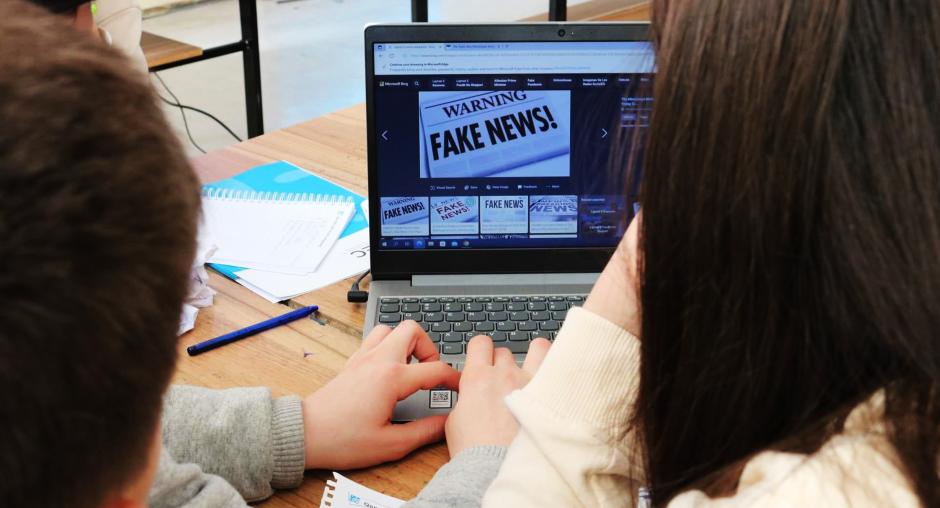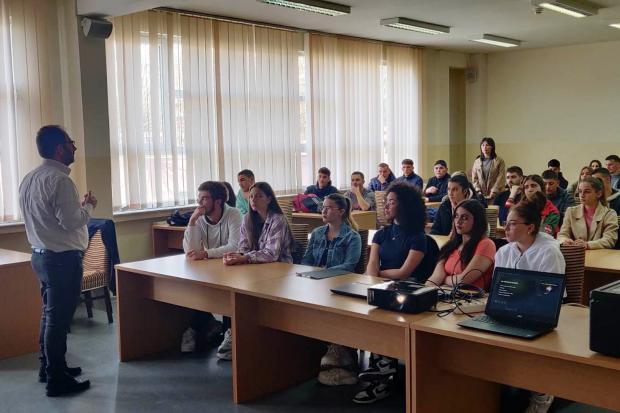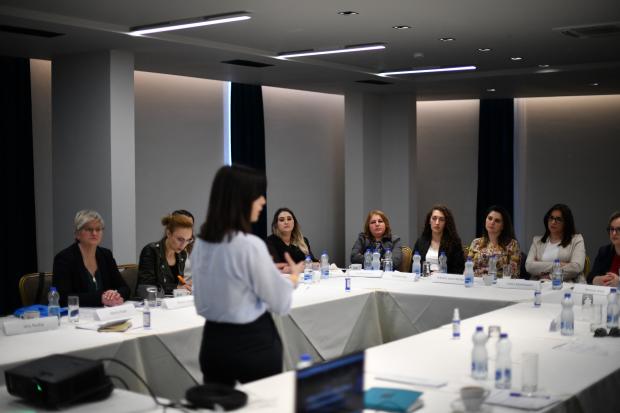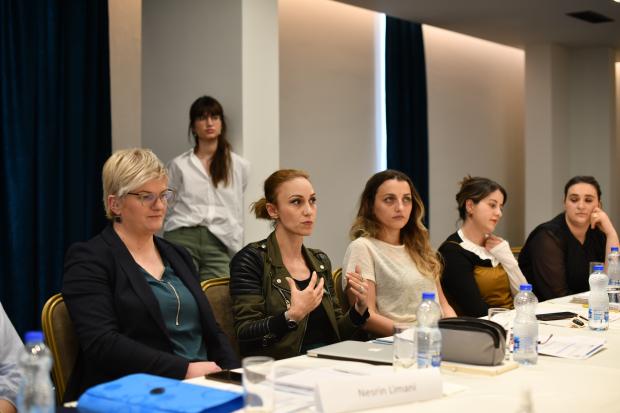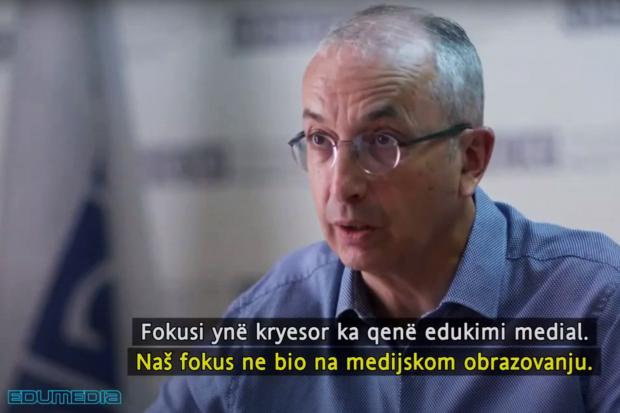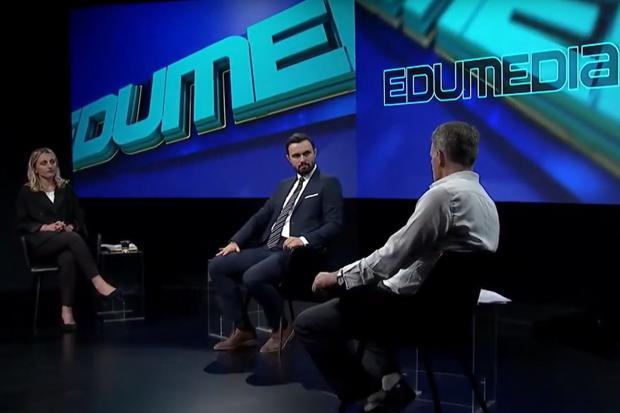Keeping up with digital world through media literacy skills
In an ever evolving and advancing digital world and with internet becoming the main source of information, young people in Kosovo are dependent on media literacy skills to navigate safely through the complex online media landscape and to think critically about the content they receive.
The abundancy of online content exposes them to various risks given that fake news, including unfiltered material on social media platforms used by young people, are also on rise and there is no mechanism to protect them from the effects this content potentially could have.
To help respond to this threat, the OSCE Mission in Kosovo launched its first media literacy initiative in 2016, focusing primarily on integrating media and information literacy as a core course in all levels of the education sector, from schools to universities. In 2017, in the Ministry of Education Core Curricula included it as a subject in pre-university levels, enabling teachers to suggest media literacy as an elective subject.
The OSCE complemented this effort with other initiatives involving direct work with students, teachers, and the public through workshops, educational TV programs and awareness raising campaigns.
Reaching students through complementary activities
The latest in the series of numerous OSCE Mission activities were 10 workshops for high school students held throughout April 2023 in different schools across Kosovo. In co-operation with DokuFest, the Mission engaged Professor Alban Zeneli at the Journalism Department to teach around 400 students how to consciously utilize technology and social media and deconstruct complex media messages.
Following the workshops, from his office in the University of Prishtina, Professor Zeneli says these kinds of activities are a crucial additional element young people need today. “These students spend a huge amount of their time on social media, but in public schools, they don’t get much information on how to behave with that digital content, so I see these workshops as complementary to their formal education,” he says.
Professor Zeneli says that from his lectures to high school students, he observed three main elements.
“The first one is that our youth are capable to develop media literacy skills, but a lot depends on the work their teachers do with them. The conditions of public schools in Kosovo are more or less the same, but there is a big difference from school to school as to how skilled the kids are depending on their teachers’ work and dedication.”
As second observation, Zeneli lists the use of social media, mainly TikTok, for 4 to 6 hours a day. “This domination of TikTok means that values that are not typically democratic and not typically for our society are being promoted. From this, they risk ending up in a bubble of thought and contradict the rest of the society.”
Beyond this, according to Zeneli, the main challenge of young people in Kosovo remains the inability to distinguish fact from opinion. “This is a basic element, and I can say that most of the young people I have met could not differentiate fact from opinion. This becomes problematic in the case of disinformation, which have more opinion than facts.”
The OSCE Mission’s workshops aimed to tackle exactly these issues. In a carefully chosen list of topics with the OSCE and Dokufest, Professor Zeneli included, among others, examples of true vs fake news, disinformation, clickbait, social media addiction, advertising, and hate speech. Through similar workshops for different groups of youth and communities in previous years, the OSCE Mission has so far trained over 1000 graduate and undergraduate students, and more than 1000 high school students on these topics.
From teachers to students
In another collaboration with DokuFest, the OSCE Mission held in May 2023 its latest and sixth consecutive annual training workshop on media literacy concepts and innovative methods, targeting high school teachers from throughout Kosovo. These series of workshops focus on classroom teaching, including integration of visual materials and documentary films. Since 2018, around 85 teachers have received the training.
According to the Head of the OSCE Mission in Kosovo, Ambassador Michael Davenport, the main objective of these workshops is to improve students’ media literacy skills by strengthening their teachers’ abilities on the subject.
Shpres Zeka Karanezi, a high school teacher from Prizren, a participant in last year’s workshop, says that presently, the majority of young people take the information as served, and are barely prompted to use critical thinking in a given situation.
“Modifying the old teaching methods is necessary. Using documentary film and the right approach with the youth are great tools to encourage critical thinking, and I have already started to include certain topics and tools in my class,” she says.
Professor Zeneli points out that public schools in Kosovo have many defects as far as teaching pupils and students the skills they need today on digital media, especially social media, and that the school does not provide them with information and tools on how to interact with the digital content.
“Similar workshops like the ones with the OSCE and DokuFest should be multiplied for the sole reason that the formal education presently does not include these necessary skills for our youth,” he says.
Ultimate goal: inclusion of media literacy in formal education
Ambassador Davenport says that the goal of the OSCE Mission is to integrate media literacy as a core course in all levels of the education sector, from schools to universities.
Some considerable progress has been achieved with several secondary schools in Prishtinë/Priština introducing media literacy in their teaching curriculums. In addition, media literacy was gradually introduced as an elective subject in public universities in Prishtinë/Priština, Gjilan/Gnjilane, Gjakovë/Ðakovica, and later on in Mitrovicë/Mitrovica South.
Moreover, the current study plans of Prishtinë/Priština, Gjilan/Gnjilane and Gjakovë/Ðakovica universities, the implementation of which began in 2021, envision the subject to be taught as a mandatory skill to all students from 2023/2024 onwards. This will enable them to critically analyse media in their lives and communities, but also prepares them for their careers.
Professor Zeneli says that the Department of Journalism at the University of Prishtina already introduced media literacy as a subject in their program. “We have media literacy as a subject in the journalism departments since 2009, initially as an elective subject and later on as mandatory. It continues to be mandatory for every student that studies journalism,” he says.
Covering all fronts
However, Professor Zeneli points out the necessity to cover more fronts with media literacy education.
“Except for the formal education, I think that our society needs to work hard with people who have already completed their education, and they need to be targeted through different non-governmental organizations, awareness raising campaigns and other informal activities. Media can play an important role, too,” he says.
“We are talking about people that finished school when these problems did not exist, when social media did not exist, and for some older generations, there was even no internet at all, so communication was centralised through two or three media channels. They knew how to behave in that environment. The media environment now is completely different; and there is the other aspect too: social media gives everyone the opportunity to speak and have a public opinion, and some people do not understand that this comes with the responsibility for the public word, too.“
“A lifelong learning concept today is necessary because of the technology development,” he says.
With this in mind, the OSCE Mission’s efforts include a variety of tools to reach as many people as possible, such as educational TV programs and awareness raising campaigns. The Mission has also supported translating media literacy textbooks in local languages, developing a comprehensive syllabus for undergraduate students at public universities, supplying university libraries with relevant literature, and organizing roundtable discussions and different competitions for young people.
Long-term solution
Beyond all the efforts, Professor Zeneli reiterates that the long-term solution is the inclusion of media literacy as a core subject in formal education.
“I think media literacy should be a separate and mandatory subject for middle school - grades 6-9, and high school - grades 9-12. To have an impact through formal education, these, I believe, should be the target groups,” says Professor Zeneli.
“Besides, this is when they have the biggest challenges, the time when they form their identity and the values in which they believe.”

